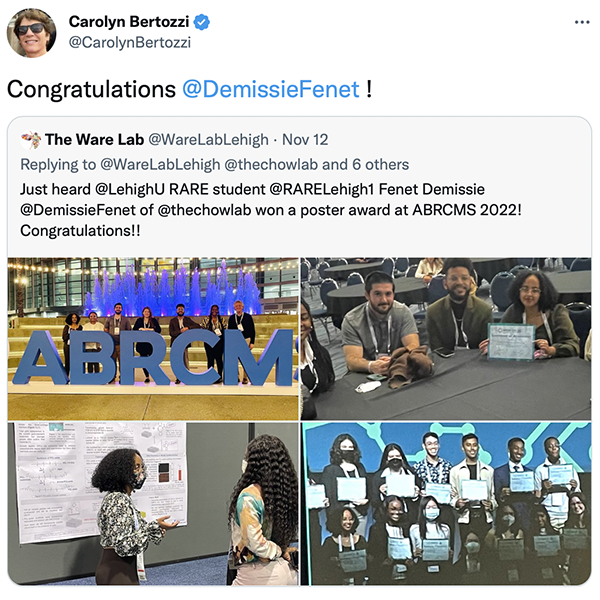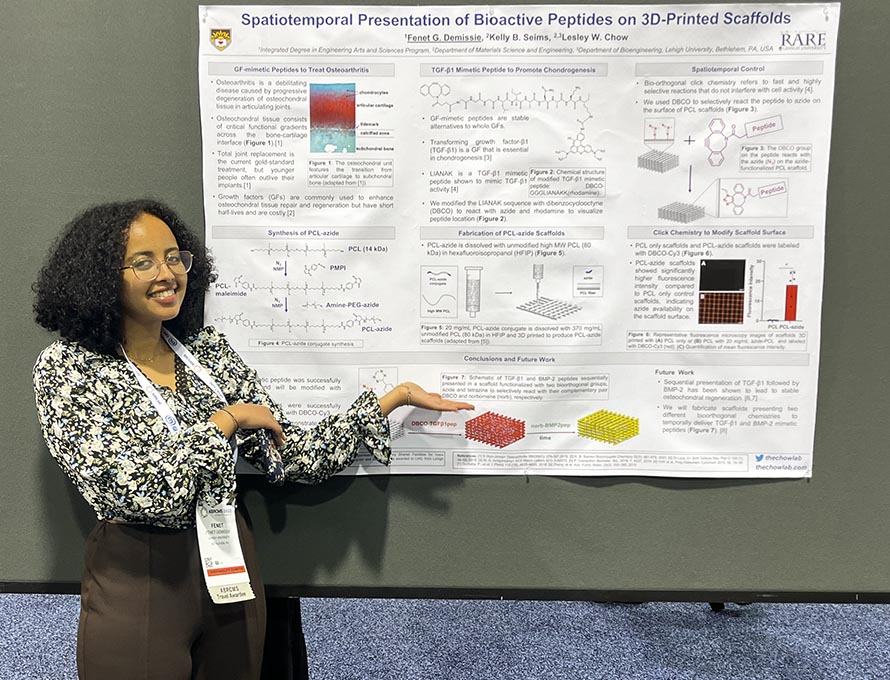Imagine receiving recognition at a conference for an outstanding research presentation.
Imagine a proud faculty mentor sharing that news on Twitter.
Imagine receiving a shout-out on the platform from the 2022 Nobel laureate in chemistry (who happens to have also received the MacArthur “genius grant” Fellowship).
 Imagine how Fenet Demissie ’24, IDEAS, felt as she was in the humble yet awkward position of having to think of an appropriate Twitter response to Carolyn Bertozzi, a titan in the field.
Imagine how Fenet Demissie ’24, IDEAS, felt as she was in the humble yet awkward position of having to think of an appropriate Twitter response to Carolyn Bertozzi, a titan in the field.
No surprise that Demissie pulled it off. Her intelligence and ability to adapt are typical of students in the RARE program at Lehigh.
Demissie was one of five Lehigh students selected to share their research through poster presentations at the Annual Biomedical Research Conference for Minority Students during the November 2022 gathering in Anaheim, Calif.
They were among 4,200 in attendance that included 2,200 undergraduates, 332 graduate students and postdoctoral fellows, and 750 researchers, program directors, and faculty.
The event draws many graduate school recruiters and faculty who seek top undergraduate talent for their universities.
Presenters were selected based on the quality of submitted abstracts summarizing their work. Three judges then questioned presenters to determine who should receive special recognition.
“My judges asked a lot of questions,” says Demissie. “I felt a bit nervous at first, but I was able to answer all of them.”
Those questions couldn’t have been easy. Her project was on regenerating worn-down joint cartilage that causes osteoarthritis.
“My presentation had two parts,” she says. “One was on the peptides that could mimic the growth factors that trigger regeneration. The second, built on Bertozzi’s Nobel research, was on the 3D-printed scaffolds that help deliver those peptides.”
 “The conference is a remarkable educational exercise for our students. It provides external validation for their work as scholars and gives them a glimpse into the scale and scope of opportunity available to them in their fields,” says Neal Simon, professor of biological sciences, who accompanied the students.
“The conference is a remarkable educational exercise for our students. It provides external validation for their work as scholars and gives them a glimpse into the scale and scope of opportunity available to them in their fields,” says Neal Simon, professor of biological sciences, who accompanied the students.
Along with Demissie, others in attendance included Michael Chavez ’23, biology; Oluwafunmbi Ojo ’24, neuroscience; Mia Stevens ’22, bioengineering; and Luis Caceres ’24, biology.
For Demissie, the conference has helped determine her future. She had been on a pre-med track for years, having dreamed of becoming a physician. But she has thrived in the lab. At the event, she was able to speak with professors, program directors, graduate recruiters, and students to help better determine her path forward: M.D./Ph.D. or Ph.D.
All of the students who attended are part of the Rapidly Accelerated Research Experience (RARE) program, which began in 2015 with a major grant from the Howard Hughes Medical Institute. RARE is a comprehensive four-year immersion program designed to improve retention and graduation rates among students from backgrounds underrepresented in STEM fields. It incorporates multiple practices, including extensive research engagement, a specialized mentoring structure, and a living/learning residential environment, to help students develop outstanding scientific abilities, leadership skills, and a strong sense of community. It is remarkably successful, with an over 90% graduation rate that places RARE among the most successful programs of this type in the country.
The program is co-directed by Simon and Vassie Ware, professor of biology. It receives nearly 80 applications each year for 18 available spots. That competition isn’t surprising for a program that has an outstanding record of placing students in prominent graduate programs, medical schools, and the workplace.
“We are working to build on our strengths and success in RARE,” says Simon. One example is the STEM Summer Institute. Entering its third year, the institute draws undergraduates from Lehigh and other institutions. A 10-week experience that includes research and professional development activities, it has grown from 54 student participants to a projected 100 this coming summer.
But funding for these programs can vary. With the end of financial support from the Howard Hughes Medical Institute, Simon and Ware are actively working to build long-term funding for a remarkable program that truly distinguishes Lehigh.
Getting students to the conference, for example, was funded by a combination of programs and offices including RARE, the Office of Diversity, Equity and Inclusion, and the Frank L. Douglas '66 Undergraduate Research in Life Sciences Endowment.
Demissie knows that so much of what she accomplished comes from the guidance of her faculty mentor and the principal investigator on her project: Lesley Chow, associate professor of bioengineering.
It was Chow who helped get Demissie on the radar of the Nobel laureate. But getting the follow back on Twitter was all Demissie.
“It was surreal,” she says about the tweet and notable new follower. “When a hero of mine knows I am out here and using her method, it is a real morale boost that I am headed in the right career direction.”
Conference Presenters included
Michael Chavez
"Examining a feedback loop between Cx43 and β-catenin during skeletal patterning"
Co-authors include Dr. M. Kathryn Iovine, professor, biochemistry and principal investigator, and Victoria Hyland, graduate student in biology
Oluwafunmbi Ojo
“Treating and Visualizing Traumatic Brain Injury”
Co-authors include Marion Donoghue, Olivia Gusdorff, Giovanne Paone, Joshua Bellon, and Mia Stevens
Fenet Demissie
“Spatiotemporal Presentation of Bioactive Peptides in 3D-Printed Scaffolds”
Co-authors include Kelly Seims and Lesley Chow
Luis Caceres
“Diversity of Mesophotic Coral-Associated Brittle Stars in the Northwest Gulf of Mexico”
Co-authors include Luke McCartin, Nicole Pittoors, Samuel Vohsen, and Santiago Herrera (Principal Investigator)
Mia Stevens
Biomarkers for Traumatic Brain Injury
Co-authors include Joshua Bellon, Olivia Gusdorff, Giovanna Paone, Marion Donoghue, and Oluwafunmbi Ojo